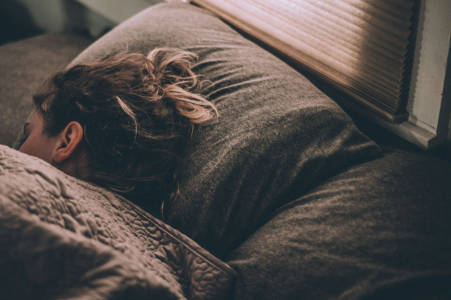The secret to your best sleep ever—doctors swear by this!
By
Aubrey Razon
- Replies 0
Struggling to fall asleep no matter what you try? You’re not alone, and waking up exhausted is all too common. But what if the secret to amazing sleep is simpler than you think?
Enter the wisdom of Dr. Charles Puza, a “biohacker” and dermatologist with an educational background from Harvard and Duke universities, who has shared a simple yet transformative formula for finding your “perfect bedtime.”
Before we dive into the formula, let's understand the science behind it.
Sleep isn't just a block of time when your body shuts off.
Instead, it's composed of several cycles, each lasting about 90 minutes, and each cycle is crucial for different aspects of restoration and health.

These cycles are made up of four stages, progressively deepening until you reach the fourth stage—REM (Repetitive Eye Movement) sleep.
REM sleep is the star of the show, vital for emotional processing, cognitive functioning, and the stage where most dreaming occurs.
Interrupting a cycle, especially during REM, can leave you feeling groggy and unrested, even after a full night's sleep.
Dr. Puza's formula is based on the principle that waking up at the end of a complete sleep cycle leaves you feeling more refreshed than being jolted awake mid-cycle.
Here's how to calculate your perfect bedtime:
1. Decide whether you're aiming for five or six sleep cycles per night. This will depend on your personal needs and schedule.
2. Add 15 minutes to your total sleep time to account for the average time it takes to fall asleep.
3. If you're aiming for five cycles, that's 7 hours and 45 minutes; six cycles would be 9 hours and 15 minutes.
4. Now, work backward from your wake-up time to find your ideal bedtime. For example, if you need to wake up at 7 AM, your perfect bedtime would be either 9:45 PM for five cycles or 11:15 PM for six cycles.
While the formula is straightforward, many of us know that falling asleep within 15 minutes is easier said than done.
Comments on Dr. Puza's video echo this sentiment, with many people expressing frustration over their inability to drift off quickly.
If you're struggling to fall asleep, consider adopting better sleep hygiene practices. These include:
A good night's rest is essential for anti-aging, muscle recovery, memory, and overall brain health.
Moreover, chronic sleep deprivation is linked to a host of health issues, including obesity, heart disease, and type 2 diabetes.
Here at The GrayVine, we understand that sleep is a precious commodity, especially as we age.
Our bodies may require more time to recharge, and our sleep patterns can change over time.
That's why we're committed to sharing tips and insights that can help you achieve the restful sleep you deserve.
 Have you found a bedtime routine that works wonders for you? Do you have other sleep tips that could benefit our community? Share your experiences with us in the comments below.
Have you found a bedtime routine that works wonders for you? Do you have other sleep tips that could benefit our community? Share your experiences with us in the comments below.
Enter the wisdom of Dr. Charles Puza, a “biohacker” and dermatologist with an educational background from Harvard and Duke universities, who has shared a simple yet transformative formula for finding your “perfect bedtime.”
Before we dive into the formula, let's understand the science behind it.
Sleep isn't just a block of time when your body shuts off.
Instead, it's composed of several cycles, each lasting about 90 minutes, and each cycle is crucial for different aspects of restoration and health.

Dr. Puza advises to plan your bedtime to synchronize with natural sleep cycles. Image source: Greg Pappas/Unsplash.
These cycles are made up of four stages, progressively deepening until you reach the fourth stage—REM (Repetitive Eye Movement) sleep.
REM sleep is the star of the show, vital for emotional processing, cognitive functioning, and the stage where most dreaming occurs.
Interrupting a cycle, especially during REM, can leave you feeling groggy and unrested, even after a full night's sleep.
Dr. Puza's formula is based on the principle that waking up at the end of a complete sleep cycle leaves you feeling more refreshed than being jolted awake mid-cycle.
Here's how to calculate your perfect bedtime:
1. Decide whether you're aiming for five or six sleep cycles per night. This will depend on your personal needs and schedule.
2. Add 15 minutes to your total sleep time to account for the average time it takes to fall asleep.
3. If you're aiming for five cycles, that's 7 hours and 45 minutes; six cycles would be 9 hours and 15 minutes.
4. Now, work backward from your wake-up time to find your ideal bedtime. For example, if you need to wake up at 7 AM, your perfect bedtime would be either 9:45 PM for five cycles or 11:15 PM for six cycles.
While the formula is straightforward, many of us know that falling asleep within 15 minutes is easier said than done.
Comments on Dr. Puza's video echo this sentiment, with many people expressing frustration over their inability to drift off quickly.
If you're struggling to fall asleep, consider adopting better sleep hygiene practices. These include:
- Keeping a consistent sleep schedule, even on weekends.
- Engaging in regular physical activity during the day.
- Creating a restful environment in your bedroom, free from noise and distractions.
- Avoiding stimulants like caffeine and nicotine close to bedtime.
- Limiting alcohol consumption, which can disrupt sleep patterns.
A good night's rest is essential for anti-aging, muscle recovery, memory, and overall brain health.
Moreover, chronic sleep deprivation is linked to a host of health issues, including obesity, heart disease, and type 2 diabetes.
Here at The GrayVine, we understand that sleep is a precious commodity, especially as we age.
Our bodies may require more time to recharge, and our sleep patterns can change over time.
That's why we're committed to sharing tips and insights that can help you achieve the restful sleep you deserve.
Key Takeaways
- Dr. Charles Puza, a dermatologist who studied at Harvard and Duke universities, suggests a simple formula for finding your “perfect” bedtime to maximize the number of sleep cycles you complete.
- A sleep cycle lasts about 90 minutes and includes four stages, with REM sleep being crucial for emotional processing and cognitive functioning.
- Dr. Puza advises to plan your bedtime to synchronize with natural sleep cycles and to add an extra 15 minutes to allow for falling asleep, aiming for either a seven hours and 45 minutes sleep duration (five cycles) or nine hours and 15 minutes (six cycles).






